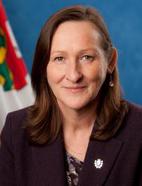Thank you, Madam Chair. Every one of the motions that were brought forward by the standing committee were brought back to the Indigenous governments. The comment was made that this will be the Premier's legacy. This is not the Premier's legacy. The Premier did not direct this. This was done at the table. The GNWT was one member at the table of the Council of Leaders. This is the Council of Leaders legacy, Madam Chair.
So within that spirit of working together in consensus, every single suggestion was brought forward to the Council of Leaders table. When we brought this motion forward and said, you know, the Regular Members would like to have a say in it, the Council of Leaders pointed out the power imbalances.
Within the act, it does state that the Members will be appointed by Indigenous governments, organizations and the Government of the Northwest Territories. That action plan committee will be taking off, probably in the next government. They can elect to have their officials there. They can elect to be there themselves if they wish to.
Any official that works for the GNWT is well aware that they report directly to the Minister, in this case myself, and they have accountability with that.
When we brought this forward, the officials had concerns, Madam Chair. They talked about the power imbalance. They know that -- they know the structure of the Legislative Assembly. They know that when Members -- Ministers are elected by the Regular Members, they represent all residents of the NWT, but they also know that Regular Members don't necessarily have to represent all members of the -- all residents of the NWT.
In fact, they are mostly reportable to their constituents and often will lobby for their constituents' needs versus all needs although there's some overlap often. So when we brought it forward, they said no, it would put them in a place that they weren't comfortable. If they had to have representation from the Legislative Assembly as the Regular Members, then they would have to consider inviting their leadership and then there couldn't be the frank discussions that happen at that table. So there was a real concern about the power imbalance, about the obligations, about the freedom to speak at will, because often when your Minister or your chief or your leader is there, you don't have the -- you have to be very careful what you say. Thank you, Madam Chair.
